- Home
- John Jakes
The Lawless Page 15
The Lawless Read online
Page 15
“Come on, my friend. Even if the bride’s sound asleep, we should have some kind of celebration. Let’s go around to the Hart and Crown. I’ll stand you to a—” Belatedly, he realized why Strelnik’s cheeks glistened. “Sime, what happened?”
Slowly, Strelnik wiped his eyes. He drew a wrinkled telegraph blank from out of the pocket of his threadbare jacket. “This arrived while you were upstairs.”
Matt unfolded the sheet. The collection of unrelated English words made no sense. “What does it say?”
“It says”—Strelnik’s voice was feeble, dry sounding—“it says Yuri was executed the same day I went into hiding in Paris. The same day! And it’s taken all this time for the crime to be discovered!”
Gently, Matt gripped his friend’s arm and lifted him out of the chair. “I’m sorry. Come out into the air. I’d say we both need a glass of beer.”
“Several of them.” He snatched the message out of Matt’s hand, flung it away. Then he repeated in a fierce whisper, “Several!”
v
As such things sometimes have a way of doing, the future of the Strelnik family worked itself out after Matt and his friend got drunk.
Their drunkenness manifested itself in different ways. Matt grew pensive, then downright melancholy, as if he were the one mourning the loss of a brother. The little Russian grew progressively more angry.
“Bastards. Prussian bastards. They’re out to swallow the whole world. Room to live—that’s all they talk about! I hope Louis-Napoléon crucifies them. I doubt he will, though. That damned Moltke’s too good a general. Well, what’s left for me in Europe?” A callous shrug. “Nothing.”
Matt wiped foam from his upper lip, blinked twice, said in a sarcastic voice, “Why don’t you emigrate to America? Hell, it’s no worse than Europe now.”
“Listen, I’ve thought about it. Consh—uh—constantly sometimes. I don’t see the United States with the same cynical eye you do, Matthew.”
“I try not to look in that direction at all.”
It was a miserable joke. As miserable as everything in his life lately. Christ, look at him! Spending his wedding night in a London grog shop. On second thought, why shouldn’t he drink till he keeled over? He had nothing better to do. Much to Matt’s disgust, Strelnik seemed to be growing excited.
“I’d like to go to America. I think Leah would too.”
“I gave you credit for more—wait a second. Miss? Refills here.”
The serving girl shrieked as he flung his empty glass. She just managed to catch it before it hit the floor. Two dart players gave him sour looks. The owner scowled.
“Matthew, you’re drunk,” Strelnik whispered. “Drunk and disorderly.”
“So what? So are you. To repeat—I gave you credit for more intelligence.”
“Come on! At least America isn’t run by a gang of bloodthirsty imperialists, the way Prussia is. At least she hasn’t got a goddamned skirt-chasing Emperor, like France. In America the workingman gets a fair shake occasionally.”
Matt snorted. “Not according to my brother. Oh, but don’t let me shatter your illusions. William Marcy Tweed and his gang will take care of that when you arrive.”
“Tweed? Who’s he?”
“Oh, just the fellow who sets the standard for public and private morality, that’s all. I only know what Gideon tells me about him, but I’ll be damned if that isn’t enough. Bill Tweed is the political boss of New York City. The Tiger of Tammany—America’s greatest spoilsman. You’ll find out!”
Strelnik refused to be daunted by the sarcasm. “My family and I must do something soon. We’re living on your dole, and that’s not right. If I could just find a job, I could earn passage money within a year or two.”
Matt sighed. “Hell, I’ll loan you passage money when my father sends the advance on my allowance”—that would probably be cheaper than maintaining the Strelniks for an indefinite period—“If you’re really serious.”
“Yes, Matthew, I think I am.”
“Then I’ll give you a letter to my brother in New York. He’s starting that labor paper I mentioned. Maybe he needs some part-time help. At least it’s someone to go see when the ship docks.”
Strelnik studied Matt a moment, smiled a sad smile and shook his head. “You know, Matthew, for a man who presents a cynical face to the world, you are really quite softhearted.”
“Is that a fact! And here I thought I was a ninny scratching my head in the midst of the cleansing revolutionary fires, or some such shit.”
“Well, yes, there’s that. But you are very generous.”
“And you are very sozzled. Finish your beer and we’ll go tell Leah you’ve lost your mind.”
He raised the heavy glass which the serving girl had refilled. “To your new homeland. May it give you more than it’s ever given me—which is exactly nothing.”
vi
In the second week of August, Dolly and Matt accompanied the Strelniks to the train that would carry them to Southampton. The emigrants had purchased space in steerage aboard a vessel sailing directly to New York.
There was a tearful farewell between the two women, fervent handshakes and hugs between the men. Strelnik had carefully packed a letter Matthew had written to Gideon.
“We’ll see you in America on your first visit!” Leah exclaimed as the conductor shouted for them to get aboard. ‘
Matt laughed. “I’m afraid you’ll be waiting a long time. I don’t expect to go back there till I’m buried—if then.”
The Strelniks clambered into their compartment. Leah held Anton up to the open window, grasped his arm and waved it. The little boy soon got the idea, waving with great enthusiasm as the train began to move.
The moment it had chugged out of sight, Dolly slipped her arm in Matt’s. She had tears in her eyes. “Oh, Matt, did you see their faces? They all looked like children about to be visited by St. Nicholas!”
“I suppose you call that innocence, eh?”
“Or hope.”
“Whatever it is, they’ll soon lose it over there.”
“I wonder. I think they see a great many good things about your country. Genuinely good things you choose to ignore.”
“Yes, I’m sure Sime’s excited about the so-called freedom of expression he’ll find in America. Just wait till he stands up on a crate on some street corner and starts spouting off about dismantling the fortunes of the capitalist warlords. Wait till he says those fortunes should be redistributed to the working class. He’ll find himself exercising his freedom of expression in the lockup, maybe for the rest of his life.”
Dolly sighed. “I believe that’s one of the qualities I hate most about painters. They’re so disagreeably cynical sometimes.”
Irked, he started to retort. Before he could, she held up a glove. “Darling, forgive me. I shouldn’t have started on that subject.”
He was astounded. It wasn’t like her to surrender.
She drew a deep breath. When his anger abated a little, he noticed the drawn quality of her face. Pregnant women were supposed to look nauseatingly healthy; weren’t they? She looked as if worry were wearing her away.
“We have other, more personal things to discuss,” she said.
He managed a chuckle. “We do?”
“Yes. Will you take me for a walk along the Embankment?”
“Good God, Doll, it was raining when we came into the station.”
“I’d just like to be in the fresh air when we talk.”
“Talk about what?”
Looking straight ahead, she said, “About us. Now that the Strelniks have gone, I can do what I’ve been planning to do for some days now.”
He didn’t understand the sad, tender expression on her tired face. Touching him, she added very softly, “I’m going to leave you, Matt.”
Chapter XIII
On the Chelsea Embankment
i
THEY LEANED AGAINST the stone railing above the Thames. Patches of blue showed in the west—
clearing weather—but light rain still dappled the river. There was steady barge traffic. The boats of the watermen scooted back and forth carrying passengers between the public stairs at the bridges. South of the river in Lambeth and Southwark further east, rows of factory smokestacks and great construction cranes jutted into the sky. Vehicular traffic clattered in the road behind them. They neither heard nor saw anything but each other.
“It’s goddamned insanity!” Matt cried.
“My dear, that’s the fourth or fifth time you’ve used the same word. But it isn’t insanity. The marriage was a mistake.”
Dolly seemed very tense, as if keeping her emotions under control only by the greatest effort. Raindrops showed as black dots on her dark green dress, and sparkled in the yellow curls over her ears. Despite the full cut of her skirt, her pregnancy was beginning to show.
“I must be the one to call a halt because you won’t,” she continued. “Your conscience won’t let you. But you haven’t done any work since we arrived in London. You haven’t even gone to inspect the crates old Onion sent to Jim Whistler’s. I know the cause—one silly, mistaken idea that affects you even though it shouldn’t. Well, I learned long ago that you weren’t perfect, or even sensible all the time. God knows I’m not either—”
“You’ve lost me. What’s my mistaken idea?”
She reached up to touch his cheek. Her wry little smile vanished. “You persist in thinking everything’s ruined for you because you have a wife.”
“Dolly, that isn’t so!” he lied. “I married you because I love you.”
“And I love you. I’ll never love any man so much. But I do know the real reason you went through with the ceremony.”
Her tone was matter-of-fact. A passing waterman leaned on his paddle and waved. She lifted her glove but Matt didn’t respond. He stared at her, then blurted, “Why?”
“Because you thought I’d destroy the baby.”
He started to deny that, too, then closed his mouth and watched the falling rain and the smoke of the chimneys staining the southern sky like the harbinger of a mechanized, dehumanized world.
“Of course I thought about it,” she admitted. “I threatened you with it, and I can only beg you to forgive that. I was desperate. I could never have gone through with it.”
He turned to see whether she was telling the truth. Her eyes said yes. Her next words reinforced it.
“Not in a thousand years, Matt. But”—up came her chin; those lovely eyes had a bright glint now—“neither did I want our child to be born without a legal name.”
“Our son. It will be a boy.”
“You think that?”
Matt nodded. “I know it.”
“Somehow, so do I. That makes a legal name important. That’s why I can’t thank you enough for going through with it.”
Humiliated, he slapped his palms on the rough stone railing. His left hand still bore bruises. His face was scarlet as he breathed, “You make it sound like some almighty deed of altruism. I love you!”
“I know you do. But I also know how you feel about—domesticity. You’re convinced it has no part in a painter’s life. I think you’re in error, but I doubt I could ever change your mind, and I’m certain it would be disastrous to try. Yet feeling as you do, you still went through with it. You gave of yourself—the most you could give—and that says a good deal about you, love. I’ll be forever grateful. Moreover your chil—your son will be grateful. I’m going to have the baby at my new place of employment, you see.”
“Your new … ? You mean you’ve got a job someplace outside of London?”
She was amused. “A good distance outside. I’m leaving England.”
“To go where?”
She thought a moment, then chose her words with care. “The Empire is very large, you know. I’ve secured a position in a rather remote part of it. I’ve been looking quite hard since I made my decision. Just two days ago, I chanced across an employment bureau that works for the government. The bureau liked my experience teaching English in Paris, and we struck a bargain on the spot. The employment contract’s being drawn now. I discovered there’s a need for women with some knowledge of literature and grammar at military posts overseas. I’ll be teaching the children of officers at—one of those posts,” she said with a slight catch in her voice. Inadvertently, she’d almost revealed her destination.
He grabbed her arm with thoughtless roughness. “Listen, Dolly. You’ve got to tell me where you’re going!”
Without any reproof, she glanced down at his hand. Red-faced, he released her. She gave a small shake of her head.
“I don’t believe it would be advisable for you to know, Matt. Your conscience might push you into coming after me.” She brushed at her nose, tears in her eyes all at once. “Then”—she swallowed—“then think of all the fine paintings that might never be finished.”
“Do you want a formal divorce? I don’t know what’s involved, but—”
“I don’t want that unless you do,” she broke in.
“No!”
He studied her then, his spirits sinking steadily. He knew what a determined person she could be; underneath her softness was a layer of iron. He thought of a half dozen things to say, all of them inane. All he could do was mutter, “At least let me send you money.”
“Absolutely not. I’ll be well paid where I’m going. And I didn’t marry you because your grandfather owned a California gold mine and your father made you heir to one third of it! If I ever need a little for the baby, I’ll get in touch with you somehow. But I doubt that will be necessary.”
“I doubt it, too. You’re a bright woman—bright and capable and strong—”
“And plump,” she teased, laying a palm over her stomach. “I wouldn’t have spoken so soon, but I have a long journey, and I must travel before some doctor forbids it—or before there’s any danger to the baby. There’ll be no danger once I arrive. My destination’s quite civilized, I understand. With an excellent military hospital. I’ll be sailing in a week, after I’ve had a visit with my family in Liverpool. I don’t know what I’ll tell them. I suppose it’s best to say we’re obtaining a divorce. They’ll be unhappy, but much less so than if they thought I was bringing an illegitimate child into the world. Thanks to you he’ll be born a Kent.”
“But why the hell won’t you tell me where you’re going?” He felt bludgeoned, nearly as physically stunned as when he’d fended Lepp’s attack. His voice grew almost boyish. “Why do you have to leave at all?”
Very crisply, she answered, “So you’ll be free. I wanted our child to have a name, but—” Tears brimmed again, unchecked this time. “Oh, I’m so ashamed of this silly crying!”
She flung herself against him, her head deliberately turned outward from the center of his chest so he had trouble seeing her face. “Even before you said you were willing to marry me, I knew I couldn’t stay with you. Not as a wife. That would destroy you. It’s cruel and sad that you don’t want or need what most people do. Affection. Companionship. A family. It’s cruel and sad for you, is what I mean to say. But regardless of what caused it, the truth is, you don’t need anything except your work. Fochet made me understand.”
“Fochet!” Another thunderblow.
“Of course. One night in Paris, he talked to me for three or four hours.”
“When? That is—I thought—”
“That he’d forgotten? How could he forget so important a favor for one of his most talented pupils? He just didn’t feel it was necessary to tell you everything, that’s all.”
“When did he speak to you?”
“The night before you took me dancing at the Moulin de la Galette.”
“But that night I asked whether you’d seen him, and you pretended to be surprised!” He did remember a suspiciously brittle tone in her voice. “Why did you lie?”
“Because I didn’t want to believe what Fochet had told me. I knew it was true, I think, but I didn’t want to believe marriage would de
stroy you. He admitted other men—Manet for one—could handle their work and the responsibility of a family as well, but he doubted you could. He said I might think that was wrong—I do—but I could never undo it. Then he gave me a better sense of the scope of your talent. A sense of all the great work that might never be done if I kept you worrying about patching a roof or paying for baby shoes until you died of misery and a sense of failure. It was bloody cruel of him to put that kind of burden on me! I was still resenting the fact that night when we danced. I got over the resentment—well, somewhat. I now know that most of what Fochet said was true. He thinks you have an immense talent, Matt. And you did make your work secondary when you married me. I can’t be any less unselfish—”
Her arm curled around his neck, squeezing as she wept and whispered, “You’re free. You’re free now.”
“I don’t want to be free that way!”
She dabbed her eyes. “But it’s all settled.”
“Nothing’s settled. I can’t get along without you!”
“Well”—she laughed, not unkindly—“there is a good deal of the helpless boy left in you, Matt. But I think you’ll find you can cope with the world on your own. You’ll have your work to fill whatever emptiness you feel occasionally. I’ll have our son. Actually, I’m rather the luckier one, don’t you think? It’s not every girl who can fall in love so wonderfully, then give a fine painter to the world, and still have his son too—”
“Fine painter? I’m a dauber, that’s all! I’d rather be married to you than paint so much as one more—”
On tiptoe, she pressed her glove against his mouth. “Don’t. Say it too often and you’ll act on it. Then you’d come to hate yourself for the rest of your life. It’s settled.”
She tugged his arm again. “Come on, love. Let’s walk a little—so people will think all this mess on my face is just the result of rain.”
Clouds scudded ahead of a freshening wind from the west. A shaft of sun speared down, gilding a section of the Thames. They walked slowly along the Embankment, both of them too bound up in their love and grief to speak another word.

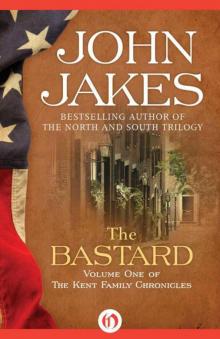 The Bastard
The Bastard The Furies
The Furies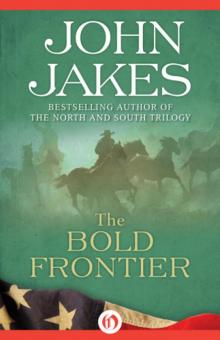 The Bold Frontier
The Bold Frontier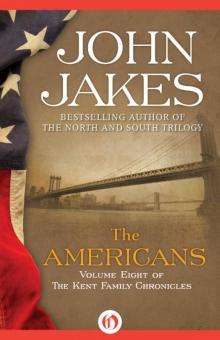 The Americans
The Americans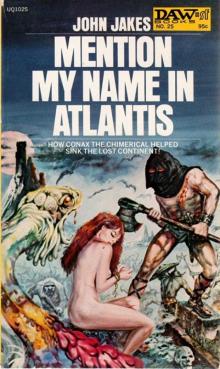 Mention My Name in Atlantis
Mention My Name in Atlantis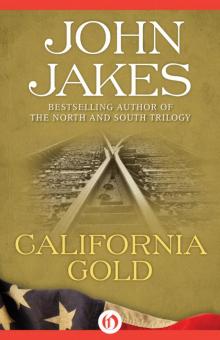 California Gold
California Gold North and South
North and South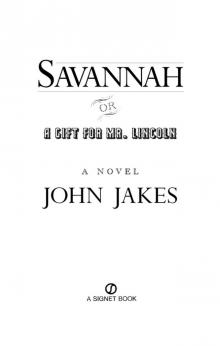 Savannah, or a Gift for Mr. Lincoln
Savannah, or a Gift for Mr. Lincoln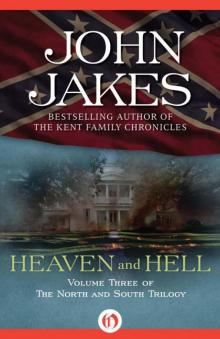 Heaven and Hell
Heaven and Hell Homeland
Homeland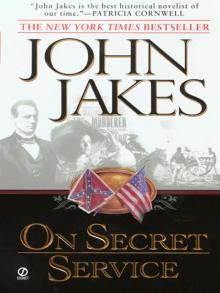 On Secret Service
On Secret Service The Lawless
The Lawless The Titans
The Titans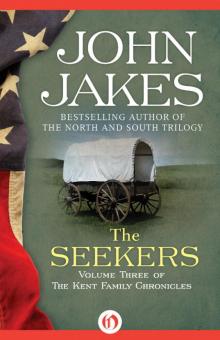 The Seekers
The Seekers Love and War
Love and War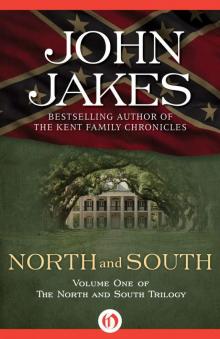 North and South: The North and South Trilogy (Book One)
North and South: The North and South Trilogy (Book One)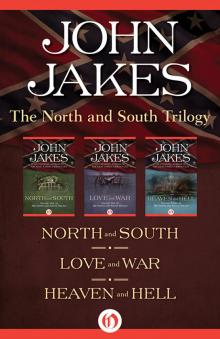 North and South Trilogy
North and South Trilogy Love and War: The North and South Trilogy
Love and War: The North and South Trilogy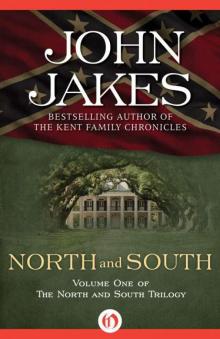 North and South: The North and South Trilogy
North and South: The North and South Trilogy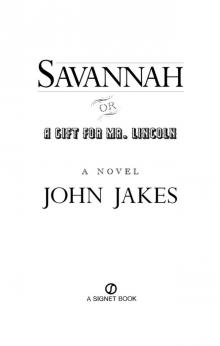 Savannah
Savannah Lawless
Lawless Conquest Of The Planet Of The Apes
Conquest Of The Planet Of The Apes Love and War: The North and South Trilogy (Book Two)
Love and War: The North and South Trilogy (Book Two) The Rebels: The Kent Family Chronicles
The Rebels: The Kent Family Chronicles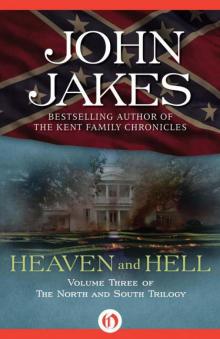 Heaven and Hell: The North and South Trilogy
Heaven and Hell: The North and South Trilogy Planet of the Apes Omnibus 2
Planet of the Apes Omnibus 2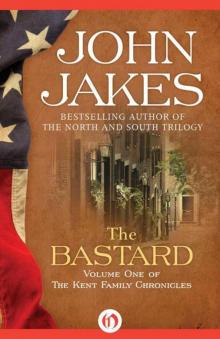 The Bastard: The Kent Family Chronicles
The Bastard: The Kent Family Chronicles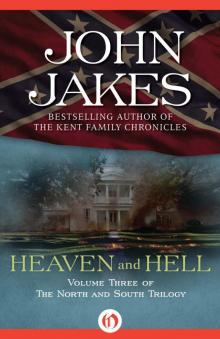 Heaven and Hell: The North and South Trilogy (Book Three)
Heaven and Hell: The North and South Trilogy (Book Three)